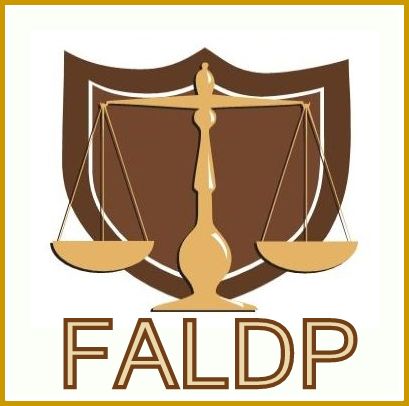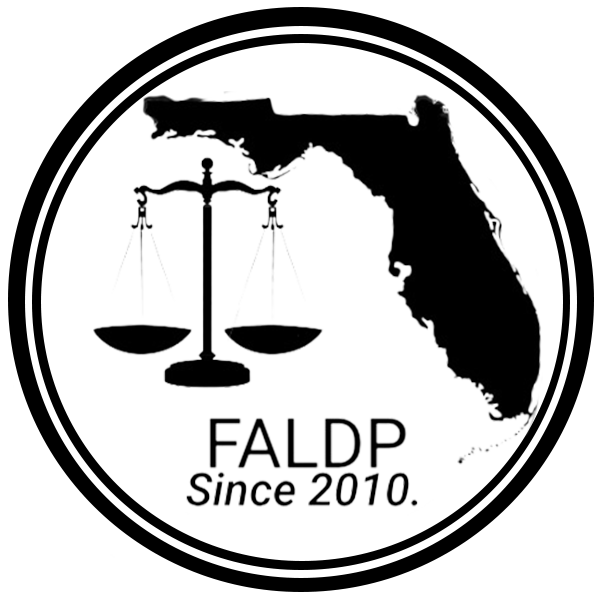800-515-0496
suggested Business Practices & Policies
for florida legal document preparers

FALDP recently reached and then surpassed our goal for signatures in our online petition:
"Allow nonlawyer legal document preparers to continue to help consumers without interference."
Our next step is to craft model guidelines for Florida legal document preparers and present them to the Florida Bar, Florida Supreme Court, and the Federal Trade Commission. FALDP Members - the proposed model guidelines are available on this page for you to read and make comments. Legal document preparers, FALDP members, future FALDP members, concerned citizens, and pro se litigants, if you'd like to be involved in creating this positive change, please read the proposed guidelines AND comment..
Thank you for your support and your signature! Together we can make Florida a better place to live.
We know of some Florida legal document preparers who have been intimidated by a Florida Bar UPL Committee investigation, and have shut down their businesses altogether. Other document preparers are afraid of the possibility of an investigation, and never give their business the attention it deserves. All the while consumers and would be customers go without any sort of help at all.
The "justice gap" is alive and well in Florida. Many Florida residents rely on service jobs for their income, or are retirees on fixed incomes. As of 2018, the median household income in Florida was $54,644, almost $9,000. less than the median income across the United States. [Statistics from the Federal Reserve Economic Data source - FRED].
Of that, $54,644. income, in 2018 22% of that gross income went to federal income tax, leaving the household with $819. net weekly income. Someone bringing home $819. per week is hard pushed to pay an attorney for even one hour of his time. Remember, median income, by definition is that half of the people's income is more than the median, and half have an income greater than the median. To put it another way: half of all Florida residents have a household income of $54,644. or less. Please note, that the income discussed is household income, not per capita (per person). So, a household of one person, may not struggle financially; but a household with the same income but with children may be struggling every week to pay the bills.
In 2018, the median hourly rate charged by Florida attorneys was $300., as reported by the Florida Bar Survey of that year.
FALDP Proposed Best Practices Guidelines
Definition of the Florida Association of Legal Document Preparers (FALDP)
FALDP is a voluntary trade
association made up of nonlawyer legal document preparers. Members
are required to meet or exceed the standards outlined on the FALDP
website (FALDP.org) in order to be eligible for membership.
Definition of Legal Document
Preparer (LDP).
FALDP member LDPs are all
nonlawyers preparing various types of documents for consumers and pro
se litigants, including but not limited to family law, bankruptcy,
immigration, civil, and post-conviction criminal. Member LDPs assist
pro se litigants and consumers by preparing documents, providing
information, and explaining to the consumer their next procedural
steps
FALDP Guidelines:
- LDPs should provide their customers with clear, plain language instructions as to how to execute their forms and instructions for the customer's next steps.
- Any notifications to be provided pursuant to these Guidelines should be understandable to the average person. Such notifications should be prominent, written in plain language, and delivered by the LDP in ways customers are reasonably likely to see, hear, or encounter. The term “notify” as used in these Guidelines, refers to notifications that conform to these Guidelines.
- LDPs should post notifications in their advertising, online and in print, stating, at minimum, that they are not attorneys and do not provide legal advice or representation.
- The forms that LDPs prepare for their customers should be valid in the intended jurisdiction to the best of the LDPs knowledge. LDPs may limit their warranties to “as is” warranties.
- LDPs should keep their forms up-to-date.
- LDPs are not to hold themselves out as if they are attorneys; and refrain from using any business name that might imply that the LDP is an attorney or practicing law. Business names such as “XYZ Legal Services”, “XYZ and Associates”, or any other name that might confuse consumers.
Consumer Protection
- LDPs should notify customers of the terms and conditions of their relationship with the LDP; and customers should have actively manifest their assent (by clicking on an “accept” button, or signing a document to assent) to those terms and conditions.
- LDPs should notify customers of all the ways (if any) they intend to use and share customers' information with third parties in keeping with the General Data Protection Regulation (GDPR) of 2018.
- LDPs should notify customers that the information customers provide is not covered by attorney client privilege or work product protection.
- LDPs should make reasonable efforts to prevent the inadvertent or unauthorized disclosure of or unauthorized access to customer information. In the event of a significant data incident or breach the LDP should use reasonable remedial and notification efforts and otherwise comply with applicable data security rules, guidelines, or best practices.
- LDPs should notify customers: (a) how long they intend to keep and maintain customer information provided to them; (b) how long the LDP will keep and maintain a completed form; and (c) how long the LDP will allow customers to request corrections or minor revisions to their documents without imposing a new or additional charge.
- LDPs should not charge excessive fees for their services.
Dispute Resolution
- LDPs should notify their customers of their legal name, address and email address to which customers can direct any complaints of concerns about the LDPs services.
- LDPs should provide a forum convenient to the customer for resolution of any dispute. LDPs should offer inexpensive, efficient and effective dispute resolution, either in court, arbitration, or mediation, including without limitation local ADR or court proceedings, online dispute resolution or similar means. LDP should not unreasonably delay the resolution of disputes with customers. LDPs should make clear that the customer may be required to pay for or share in any costs of dispute resolution.
Recommendations
- LDPs should notify their customers that their services are not a substitute for the services of a lawyer, and that customers may benefit from the services of a lawyer if their dispute is complex or important rights are at risk.
- LDPs should not advertise or describe their services in a manner that suggests their services are a substitute for legal advice or representation.
- LDPs should adhere to Florida Bar Rule 10.2 which states: (b) Paralegal or Legal Assistant “... It constitutes the unlicensed practice of law for a person who does not meet the definition of paralegal or legal assistant to use the title paralegal, legal assistant, or other similar term in offering to provide or in providing services directly to the public.”
- LDPs are not to use the titles “Esquire”, “JD”, or “juris doctor”.
- LDPs should adhere to Florida Bar Rule 10.2.2 (a) Supreme Court Approved Forms. “ ...It shall not constitute the unlicensed practice of law for a nonlawyer to engage in limited oral communication to assist a self-represented person in the completion of blanks on a Supreme Court Approved Form. In assisting in the completion of the form, oral communication by nonlawyers is restricted to those communications reasonably necessary to elicit factual information to complete the blanks on the form and inform the self-represented person how to file the form ..”
- LDPs should adhere to Florida Bar Rule 10.2.2 (b) Forms Which Have Not Been Approved by the Supreme Court of Florida.
(1) It shall not constitute the unlicensed practice of law for a nonlawyer to engage in a secretarial service, typing forms for self-represented persons by copying information given in writing by the self-represented person into the blanks on the form. The nonlawyer must transcribe the information exactly as provided in writing by the self-represented person without addition, deletion, correction, or editorial comment. The nonlawyer may not engage in oral communication with the self-represented person to discuss the form or assist the self represented person in completing the form. (2) It shall constitute the unlicensed practice of law for a nonlawyer to give legal advice, to give advice on remedies or courses of action, or to draft a legal document for a particular self-represented person. It also constitutes the unlicensed practice of law for a nonlawyer to offer to provide legal services directly to the public.
- LDPs should adhere to the best of their ability and knowledge, rules about the unauthorized practice of law which exist only in case law, and are not part of the Florida Bar Rules. These are: (1) the prohibition of using the phrase “free consultation” in their advertising; (2) refraining from preparing forms for Medicaid Planning; (3) refraining from preparing a Personal Services Contract for Medicaid Planning. Only attorneys and financial advisers may assist consumers with Medicaid Planning.
Comments Please.
As you may know, the ABA published guidelines for legal document preparers in August 2019. And, although they had some great ideas and the guidelines were not overly restrictive, we believe they were not exactly on point. Because of that, we created our own proposed FALDP Best Practices Guidelines and in the future, will expect everyone to be respect the guidelines and strive to follow them as closely as possible. For that reason, we're requesting your input now, while they are proposed guidelines. We'll leave the comment period open through February 2020. Our intention is to send our FALDP Guidelines to the Florida Bar, the Florida Supreme Court, and the Federal Trade Commission and state that these are the guidelines we agree to follow. Speak your mind.
We need your input and feedback - please comment.
As most of you know, we've been running a Change.org petition for some time. In that petition we asked the Florida Bar to let us do our work in peace. We gathered enough signatures to declare our petition a victory. And, we intend to send a copy of these guidelines to the Florida Bar, the Florida Supreme Court, and the Federal Trade Commission. Your insights, suggestions, and recommendations are important. Please comment.
Additional General Guidelines and Best Practices for FALDP Members
Responsiveness: Make sure it is your habit -- your standard operating procedure -- to answer every customer question; return every call; and respond to every email. Even though the question may seem trivial to you, or you already answered it, or its there plain as day on your site. Answer anyway. Your customers need you. Some people need to be told more than once in order to absorb the information. Be patient with your customers. Much of the information that you give your customers is brand new to them. A simple bit of information that we take for granted, such as the other party has 20 days to respond after being served, is all new to your customer. And your customer is not only in the middle of a divorce or a law suit, your customer is also very likely in the middle of a very stressful point in his life. Your empathy and patience go a long way.
Disclosure: Go the extra mile in ensuring that your customer is well aware of your professional limitations. We suggest that you not only have your customers sign the Disclosure from Nonlawyer, but also post it on your site. A click through contract where customers must acknowledge that they have read your disclosure/disclaimer before submitting payment is also a great feature for your website. When speaking with your customer, whether face to face, in chat, or on the phone, its good practice to say within the first 30 seconds of first contact with a new customer:: "I am not an attorney, I am a legal document preparer. What that means is that I can prepare your documents, explain procedure and give you legal information, but cannot give you legal advice or representation." And if your customer has a question, tell him or her: "I will answer your question if I can". When a customer asks if you're a paralegal, say, no, in Florida we are not called paralegals unless we work under the direct supervision of an attorney. We use the term, legal document preparer. (Florida document preparers are also prohibited from referring to themselves as legal assistants).
Refund Policy: Clearly state your refund policy on your website, in your contract, or prominently displayed in your office. If your refund policy is - no refunds - make it clear to your customers so that there is no question. There will be occasional disputes or misunderstandings between you and your customer. Many document preparers' refund policy is no refunds; with a few exceptions. Then leave it to your own discretion to offer a refund based on the situation. Sometimes offering a refund is worth far more than the headaches a disgruntled customer can cause you.
Delivery: Always, always, always under promise and over deliver. Tell your customers that their documents will be ready within the time frame established in your business policy. Then do your best to have their documents ready and prepared in less time than you promised. When you do this, your over delivery makes you a hero. And on the occasion when you cannot deliver until the last day of your deadline, you are not letting them down, you're doing exactly as promised. Make it clear to your customers the manner in which their documents will be delivered. If by mail, email, or courier, make sure that your customer knows what to expect.
The Button Up: Do this twice. After intake, after collecting your customer's information, ask if they have any questions. If there was information that you need to complete their documents, that they were lacking, remind them to provide it. Then, tell them what happens next. Something like -- now we'll get to work and you can expect your documents within one week. Then once delivered, give them a follow up call, email, or text to let them know what happens next. If your services are virtual, so everything is over the phone and over the internet, send completed documents as email attachments, with a cover letter which includes their step by step instructions. Proofread, print, notarize, make copies, etc. If they will be having the documents served on the other party, make sure that they're clear on how to accomplish that.
Pricing: We don't set pricing guidelines for FALDP members. Our suggestion is to check other members' and competitors' sites to get an idea of what others charge. Then consider whether your services are comparable. Some document preparers file their customer's documents; others handle service of process for their customers; others include notarizations in their price; still others offer none of these secondary services. Charge what the market will bear in your area. And, base your prices on what you believe is fair to the customer, and fair to you. We strongly suggest that document preparers post their prices on their websites, whenever possible. Pricing transparency provides consumers an extra layer of confidence in your services, knowing that you're not picking a number out of the air, based on your perception of what the consumer will pay.
Culture of Collaboration: Within our association, we have created a culture of collaboration. Sometimes we compete with one another, but at the same time we are all members of a group larger than the sum of its parts. If any member needs help with a project, or has a question I can answer, I'm happy to help. When I don't know the answer, but I know another member might know, I'll suggest who to contact. Each of us has knowledge and experience that may help another. Share freely with one another. You may need that member's help next time. Please be helpful and considerate towards your fellow members. We are colleagues and are all in this together serving pro se litigants against extreme odds.
Copyright 2010-2025 ~ All rights reserved.

